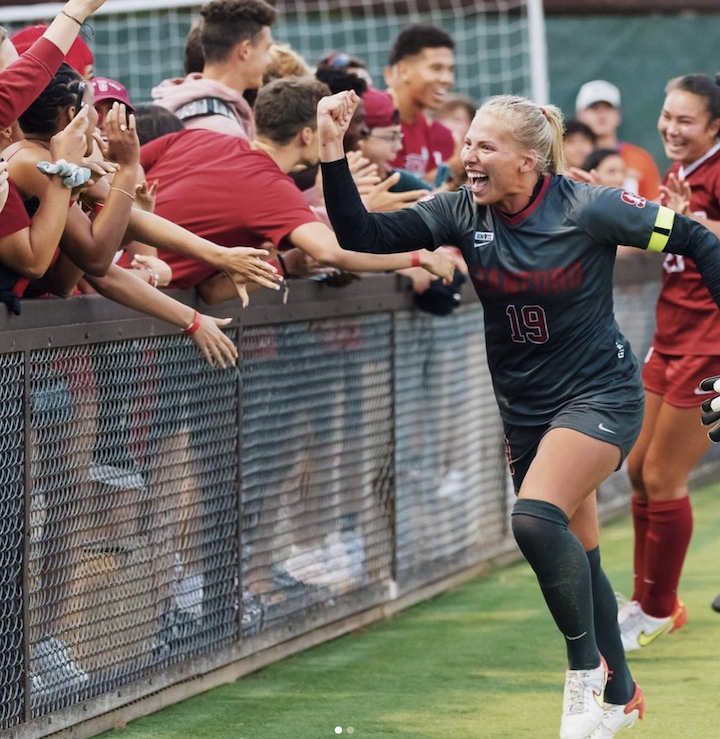An absolute force of nature on the soccer field, Katie Meyer, senior captain and goalkeeper for Stanford University’s women’s soccer team, was eagerly waiting on a decision from Stanford Law School in 2022, ready to take on the next challenge that came her way.
In addition to playing soccer at the Division I level, Meyer was an RA, a Defense Innovator Scholar for Stanford’s Gordon Knot Center for National Security Innovation and the creator of the podcast “Be the Mentality.”
“Katie was flourishing,” her father, Steve Meyer, recalled.
When 22-year-old Meyer died by suicide in March 2022, parents Steve and Gina Meyer’s first question was, “How did we not know?”
“She was going to teach a class at Stanford design school, she was going to do a TED talk, she was excited about so many things,” Steve Meyer said.
But an email Katie Meyer received Feb. 28, 2022, upended all that.
In August 2021, Meyer spilled coffee on a Stanford football player while riding her bike. The player, who suffered burns on his back, sexually assaulted a first-year teammate of Meyer’s a week prior to the coffee incident, according to the LA Times.
On Feb. 28, the final day that disciplinary charges could be brought against Meyer, she received an email from Stanford’s Office of Community Standards telling her that her degree would be placed on hold and she could potentially be expelled. Meyer was the only person to receive word of this.
When asked about St. Joe’s protocol, Joseph Peltzer, director of Community Standards, referred The Hawk to the Student Handbook, which states that “upon receiving notice of an alleged violation, the appropriate Hearing Officer or Board Moderator shall notify the respondent via university email.”
Gina Meyer said after receiving the email, her daughter experienced something doctors told her parents was an “acute stress reaction,” leading her to take her own life that same night.
“In that moment of receiving the disciplinary letter, we can only surmise she kind of went into a panic,” Gina Meyer said. “There was no health history of mental illness, there were no red flags, there was nothing that she told us.”
The Meyers said they didn’t know about the email until after their daughter had committed suicide. In fact, she hadn’t told anyone.
Turning their grief into action, Steve and Gina Meyer created Katie’s Save, with the hopes that future parents and loved ones will be better informed of potential struggles college-aged children might be facing.
One of Katie’s Save’s primary initiatives is a two-page waiver, a consent form students can opt to fill out if their respective university offers it. The form requires the institution to email an adult or ‘designated advocate’ selected by the student if the student has been notified about a range of issues, including disciplinary action, academic probation and substance abuse charges. The goal: for a trusted adult to be aware and provide support as needed.
“At least somebody on the outside of the institution knows there’s something going on and they can dig deeper,” Steve Meyer said. “That conversation, or at least the chance of that conversation, is the exact conversation that Gina and I never got to have with our daughter.”
Classified as a “front-end safety net” by Gina and Steve Meyer, the initiative strives to protect college students, who are legally considered adults, from having to deal with challenging news or information on their own.
“You’re an adult, but yet your brain is not fully developed until you’re 25, and that’s just science,” Gina Meyer said. “All that good judgment making, rational decision making, that prefrontal cortex is not fully developed. So if in a challenging or stressful situation, under 25s can sometimes think irrational, emotional, impulsive.”
Steve and Gina Meyer have also partnered with doctors and other organizations who are dedicated to expanding Katie’s Save. Matt Mishkind, Ph.D., an assistant professor of psychiatry at the University of Colorado, has been collaborating with the Meyers on suicide prevention and training for athletic staff, coaches and peers.
In order to pilot a program where student-athletes would be trained in suicide prevention and becoming peer navigators, Mishkind said he worked alongside Western Illinois University to put together a grant application to the NCAA.
Mishkind said this training can help student-athletes, as well as athletic trainers and coaches, to understand the needs of those around them.
“From a day-to-day perspective, I think certainly what we’re trying to do is help people understand how to notice things in others that might be risk factors,” Mishkind said. “To be able to engage in conversation, open conversation, and take steps that would help somebody get whatever help they might need.”
In an effort to get the initiative instituted for as many universities as possible, the Meyers took Katie’s Save to the California state legislature with the hopes of getting it passed as a bill.
The Katie’s Save bill, AB 1575, could be voted on by early 2025. The bill would require all public California State and University of California schools to offer the Katie’s Save initiative.
But the work does not end in California. The Meyers aspire for the Katie’s Save initiative to gain national attention in other divisions and leagues.
“The hope is there is a ripple effect,” Gina Meyer said. “The hope is other conferences pick this up, other states pick this up.”
The Meyers said they hope their daughter would be proud of the work they are doing for student-athletes across the country.
“She’s the type of daughter that made us as parents want to be the best parents we can be,” Steve Meyer said. “Katie wanted to change the world. She had big aspirations for a lot of different things, and I guess we can believe that she can see us right now, and she would be really happy with it.”

This story is part of a series focused on college athletics and mental health. It highlights ongoing efforts by different programs and individuals to break the stigma surrounding mental health across the NCAA.









































